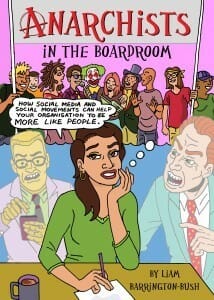 When did voluntary action become a ‘sector’? When did groups working to achieve social change start to have their own ‘Chief Executives’? When did ‘a seat at the table’ come to trump ‘an ear to the ground’?
When did voluntary action become a ‘sector’? When did groups working to achieve social change start to have their own ‘Chief Executives’? When did ‘a seat at the table’ come to trump ‘an ear to the ground’?
The professionalisation of social change has come with many costs: out-of-touch services, campaigns that can’t move beyond addressing symptoms of social ills, miserable working lives and dehumanising experiences for those involved in or with organisations, to name a few.
We’ve too often bought the line, fed from government ministers and corporate head honchos alike, that ‘we need to be more professional if we want to be taken seriously.’ However, ‘professionalism’ usually translates into being more like those who are telling us to do so: corporations and the state.
But there is an alternative.
Rather than modelling ourselves off the very structures we spend so much time trying to address or undo the damage of, why not focus on finding ways of organising ourselves for social and environmental transformation that reflect the kinds of world we want to eventually create?
It’s easier than it sounds. We do it all the time when we don’t have our organisational hats on. In situations where we aren’t being paid, don’t have job titles and aren’t trying to work to the detail of a business plan, it is both decent and practical to interact with one another according to the values we hold close. Given most of our non-organisational work is reliant on cooperation with others, it is in all of our individual and collective best interests to treat each other as we would like to be treated ourselves. I don’t buy any argument that suggests this should change when we move into our working lives.
I call this ‘helping organisations to be more like people.’ It’s a simple idea through which I believe our organisations reconnect with some of the things that have been lost since we decided to adopt a more corporate approach to change.
Platform is one of the organisations I feel is leading the way, not letting all the pressing outside issues they face become an excuse to avoid getting their own house in order, working to live the values they want to create in the world through the processes they are using to create it.
I’ve written about them in my book, Anarchists in the Boardroom: How social media and social movements can help your organisation to be more like people.
Instead of hierarchical pay structures, in which the time of some is valued disproportionately over that of others, Platform use a more fundamentally equal ‘Social Justice Waging System.’ But rather than interpreting ‘everyone’s time is equal,’ to meaning ‘everyone’s needs are the same,’ it recognises the subjective differences in people’s lives and adjusts the base wage for individuals that, say, have kids to feed.
I like this approach because it combines a basic level of equality, with the individual subjectivity that is so often lost in most of the systems we create. It appreciates our differences, without assigning us greater or lesser value than someone else as a result of those differences.
Another piece of Platform’s approach that resonates with me, is their comfort in ‘thinking aloud’ about difficult organisational questions and decisions. Rather than hiding behind closed doors and emerging with a ‘perfect’ strategy or plan, they choose to do a lot of their thinking out in the open, using Facebook, Twitter and their blog to take advantage of the ‘wisdom of the crowd,’ asking honest questions of those around them, and learning and growing as a result of what they hear. They don’t see social media simply as a broadcast channel, but also a way to learn from far more people than they could ever employ, but who have an interest in helping them improve.
Again, this is the kind of thing people don’t often think twice about doing in the rest of our lives. We happily ask for advice or help from those around us when we need it, and offer in back in return, without any sense of obligation in doing so.
Richard Wilkinson, author of the The Spirit Level, said in an interview with Yes! Magazine, that ‘Employee ownership turns a company into a community.’ My experience with Platform highlights that ownership is not necessarily a financial question, as much as it is a questions of individual agency, while still feeling part of something bigger than yourself. In other words, Platform feels more like a community than an organisation. And I think this is something all of our social change organisations can be working towards.
Liam Barrington-Bush is co-founder of more like people. He has recently crowd-funded and self-published Anarchists in the Boardroom: How social media and social movements can help your organisation to be more like people. He tweets as @hackofalltrades and curates the ‘more like people‘ Facebook page. He likes punk rock, hip-hop and tattoos, and is more approachable than his facial hair suggests.